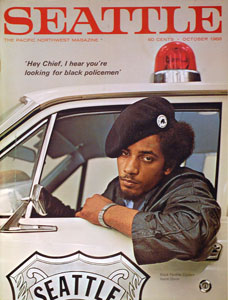Return to KRAB Audio Archives main menu
The KRAB Audio Archive
Spoken Word Programming - The 1960s
Go to spoken word programming of the | |||||
Programs are listed in chronological order. Problems listening, or comments? Email: KRABarchive
The text in bold italic that begins each program description is quoted from the original program guide entry. As some tapes lack complete descriptions, and we do not yet have all the program guides in which to find a description, some of the notes below are vague. If you can enlighten us about any program, please email us about that too.
Drug Addiction and the Law - A Panel Discussion - Spring or Summer 1963
Before "Free Form" there was "Free Forum" radio. The first reference I have found to "free-forum" is in the letterhead Lorenzo used for An Impassioned Plea for Committee Members to Aid an Incipient Radio Station written in mid 1962. In Dec 1963, the first year anniversary program guide essay talks of free-forum listener-supported radio and of how "it consumes us now." "Free-forum" pops up repeatedly throughout the 22 years, finally in Feb1982 in a working paper position statement of programming goals: "In the areas of politics, philosophy, and science two principles apply: first, KRAB must be a true free forum of ideas, championing First Amendment rights. Second, it must seek out individuals and productions which are outstanding, innovative, controversial, and culturally diverse."
This program is one of the earliest examples of a KRAB panel discussion, recorded sometime in the Spring or Summer of 1963. We cannot be more specific with the date because the program guides for most of 1963 have not been located. I am proposing Spring/Summer for the window of its occurrence because during that season it was not unusual during a break midway in a program to open the door to the outside to cool down and air out the studio. You can hear the traffic on Roosevelt, as participants wandered outside. Another clue, however, is that the program was shared with KPFA, which broadcast it on Nov 12, 1963.
The panel is moderated by Dr Nathaniel Wagner, with Dr Frederick Lemere; Dr Alexander Grinstein, King County Jail Physician; Dr Paul O'Holloran; and Attorneys Irving Paul and John Caughlan.
In 1963 Dr Nathaniel Wagner was a professor of psychology and obstetrics/gynecology at the University of Washington. He was an occasional participant in KRAB programs.
John Caughlan was a Seattle attorney and regular commentator and program participant at KRAB. He testified before the FCC in support of KRAB at the short-term license hearing. A biographical sketch prefacing a series of oral history interviews on the University of Washington's Seattle Civil Rights and Labor History Project site notes the following: "With a career that spanned more than six decades, John Caughlan became one of Seattle’s most prominent and dedicated civil rights attorneys. Born in 1909 to a radical Methodist family in Missouri, Caughlan graduated from Harvard Law School in 1935 and came to Seattle shortly thereafter. Caughlan first became involved in progressive causes when he represented the Communist Party in 1937 and defended their right to hold a rally in the Seattle Civic Auditorium. In the 1940s, Caughlan provided legal council to many people brought before the Canwell Committee and represented many UW professors and affiliates fired for alleged ties to the Communist Party. In his latter years, Caughlan represented civil rights activists in Mississippi, members of the Black Panther Party, and many others who had faced legal prosecution based on radical beliefs. In 1987, Caughlan received the ACLU’s William O. Douglas award for 'outstanding and sustained contributions to the cause of civil liberties and freedom.'"
As mentioned above, we acquired this copy of the program from the Pacifica Radio Archives. We were fortunate that the program was sent by KRAB to KPFA, and, miracle of miracles, they saved it.
![]() Listen now - Drug Addiction and the Law - A Panel Discussion - Spring or Summer 1963 (96:53)
Listen now - Drug Addiction and the Law - A Panel Discussion - Spring or Summer 1963 (96:53)
Recording courtesy Pacifica Radio Archives, bb5430
NEW MAY 2021: The Homosexual in Our Society - Rec KPFA May 2, 1958, First KPFA airing Nov 24, 1958; KRAB Dec 9, 1963
8:00 - A panel discussion as presented over KPFA in 1958, in which several psychologists discuss the social and mental roots of homosexuality, and the effects of contemporary laws and mores on the average homosexual. [Description in KRAB program guide]
This program, and "Live and Let Live" which is posted immediately below, were both scheduled to be broadcast on the evening of Dec 9, 1963, from 8:00 to 10:30 PM (2 hours and 30 minutes). As the total length of the recordings comes to over 3 hours there is a question as to what was actually broadcast. But it was not rare for KRAB to have a program run beyond the time scheduled in the guide, and it is likely that is what happened.
According to the literature, the Nov 24, 1958 broadcast by KPFA was the first in which homosexuality was discussed on radio. The airing on Dec 9, 1963 by KRAB of this and the program that followed it ("Live and Let Live") appear to to be the first time the subject was discussed on KRAB. It would be interesting to know how these programs were introduced on KRAB, and what the audience response was, but we have not found anyone associated with, or listener to, KRAB who recalls scheduling, airing or hearing either program.
Though the American Archives of Public Broadcasting describes KPFA's broadcast of "The Homosexual in Our Society" as "ground breaking" and the New York Times described "Live and Let Live" as taboo breaking, no mention of KRAB's broadcast has been found in the contemporaneous Seattle press.
This description in the KPFA folio is a bit more informative than KRAB's:
The program is composed of two parts. The first one deals chiefly with the problems faced by the individual who is homosexual; the second part attempts to deal with the role society should play in relation to such individuals. The speakers in the first discussion are Harold Call, Editor of the Mattachine Review; Mrs. Leah Gailey, housewife; and Dr. Blanche Baker, psychiatrist. Speakers in the second discussion are Dr. Karl Bowman, Professor Emeritus, U. C., and former Head of the Langley Porter Clinic; Dr. Frank A. Beach, Jr., Professor of Psychology, U. C.; Morris Lowenthal, San Francisco attorney; and Dr. David H. Wilson, Department of Criminology, U. C. Both discussions are moderated by Elsa Knight Thompson. This program, which attempts to deal constructively with on especially difficult social problem, should be listened to in its entirety. [KPFA Folio description]
KRAB's program guide note may have been colored by Lorenzo's animus toward Elsa Knight Thompson, KPFA's Public Affairs Director and the moderator of "The Homosexual in Our Society". (See part II of Lorenzo's review of "Pacifica Radio, The Rise of an Alternative Network" written by Matthew Lasar)
These recordings have been shared by the Pacifica Radio Archives (PRA) with the American Archive of Public Broadcasting (AAPB), and are streamed from the AAPB here.
![]() Listen now - The Homosexual in Our Society, Part 1 - KPFA Nov 24, 1958; KRAB Dec 9, 1963 (55:04)
Listen now - The Homosexual in Our Society, Part 1 - KPFA Nov 24, 1958; KRAB Dec 9, 1963 (55:04)
![]() Listen now - The Homosexual in Our Society, Part 2 - KPFA Nov 24, 1958; KRAB Dec 9, 1963 (55:15)
Listen now - The Homosexual in Our Society, Part 2 - KPFA Nov 24, 1958; KRAB Dec 9, 1963 (55:15)
“The Homosexual in Our Society (Parts 1 and 2 of 2),” 1958-11-24, courtesy of Pacifica Radio Archives, American Archive of Public Broadcasting (GBH and the Library of Congress), Boston, MA and Washington, DC
NEW MAY 2021: Live and Let Live - WBAI Jul 15, 1962; KRAB Dec 9, 1963
9:00 The controversial panel discussion presented on WBAI in New York, where seven anonymous homosexuals spoke frankly and disarmingly about the homosexual society, their jobs, their views of women, their morality, and their relations with the law. This totally free discussion was recorded and moderated by Dick Elman of WBAI. [Description in KRAB program guide]
KRAB's program guide description is similar to WBAI's folio of Jul 15, 1962 shown below:
LIVE AND LET LIVE: Eight practicing homosexuals from varying backgrounds and occupations discuss the homosexual's "moral" code - his attitudes toward promiscuity, domesticity, social responsibility, politics, and the world of work - in an unusually candid recording in a West Side apartment during which the attitudes of the "straight" world and the homosexual community are compared and analyzed. A WBAI Public Affairs production. [WBAI Folio description]
On the back of the same WBAI folio (#314, Jul 9-22, 1962) there is the following Program Note, which confirms other accounts of how this program came to be:
"PUBLIC AFFAIRS department had a visitor with a Madison Avenuish card bearing the pseudonym 'Randolfe Wicker, Public Relations Director, Homosexual League of America.' Believing in the right of minorities to be heard, WBAI responded by producing the unusual group-interview program Live and Let Live."
Richard Elman, WBAI's Public Affairs Producer in 1962, in his book "Namedropping, Mostly Literary Memoirs", confirms that Wicker, in response to the format of KPFA's "The Homosexual in Society" desired to do a program in which homosexuals would speak for themselves: "What he wanted was to present homosexuality from the point of view of a more or less contented homosexual."
In response to audience interest, both Pacfica (KPFA, KPFK, and WBAI) and KRAB would occasionally transcribe a "popular" program. The "Realist" (Paul Krassner's broadside) serialized the transcript of "Live and Let Live" over Aug, Sep, and Oct 1962. In 1965 Pacifica (well, KPFK) published the "Annual Annual" to describe and document "the Pacifica experience" and honor programs they thought significant. They included the transcript of "Live and Let Live", and so have we.
![]() Listen now - Live and Let Live - WBAI Jul 15, 1962; KRAB Dec 9, 1963 (94:53)
Listen now - Live and Let Live - WBAI Jul 15, 1962; KRAB Dec 9, 1963 (94:53)
The recording of "Live and Let Live" is courtesy of the Pacifica Radio Archives, BB4416a and BB4416b
Examples of some other programming produced at KRAB responding to LGBT issues
Jul 8, 1964 - A panel discussion about homosexuality, with Rev Peter Raible, Unitarian minister; David La Rose, attorney; Gerald McCarty, psychologist; and Carl Brownsberger, psychiatrist. Repeated Mar 31, 1965
May 30, 1966 - "Somehow, you just get a feeling . . . " - Two men who seek sexual relations among their own sex talk about homosexuality, Seattle police, the gay life in San Francisco, the kinds of jobs they like best and their attitudes toward queerdom. They are interviewed by Rev. Mineo Katagiri and Lorenzo Milam.
Jan 19, 1971 - AND AINT I A WOMAN? Produced by the Anna Louise Strong Brigade of Women's Liberation.
Sep 17, 1972 - THE GAY SHOW - Shan & Paul present theatre & comment
Nov 13, 1972 - Seattle Police Harassment of Homosexuals - Discussion of pressures on the gay community & of the Seattle Counseling Service for Homosexuals.
Apr 14, 1974 - HOMOPHOBIA: A CONTEMPORARY PARANOIA - Queer! Faggot! Homosexual! Do these words threaten you? Do these people bother you? Are you one of the above? Gay and straight men will present a panel discussion and listener call-in program dealing with homophobia - what it is, where it came from, and its implications for self-actualization and Western culture. We hope you'll participate. Produced by the Men's Resource Center.
Aug 5, 1974 - THE WOMAN'S SURVIVAL KIT - The Lesbian Feminist Radio Collective will present a critical examination of therapy for lesbians. Includes an actual therapy presentation of aversion therapy. With interviews and commentary, music, and a play Edward the DYKE.
Mar 1, 1980 - SURVIVING IN THE PATRIARCHY - News w/a feminist perspective--brought to you by the Didactic Dykes News Team. Produced by Amazon Media.
The Shan Ottey Collection - Early in the KRAB Archive project we learned that former KRAB volunteer-producer Shan Ottey had a collection of tapes that needed preservation, digitization, and a home. Feeling that the collection was too large for the KRAB resident archivist to process, we advised a contact at the University of Washington of the existence of the collection, and they took the project on. As of today the collection of 219 reels has been digitized, and 101 audio segments now shared online. Other recordings are available for listening in the UW Special Collections Reading Room. https://content.lib.washington.edu/krabfmweb/
Note: If you would like to help the KRAB Archive project, we need more information about the recordings in the Shan Ottey Collection. There wasn't a lot of detail on the tape labels, and most of these programs just got generic descriptions in the program guides, so any help that former listeners of "WE Women Everywhere", and other programs produced by Amazon Media and the Lesbian Feminist Radio Collective might provide would be greatly appreciated. Please contact archivist@krabarchive.com
A Few Mild Thoughts On Reality, AKA Radio Sociology - Programs About Ideas - Mar 1964
The following is Lorenzo W Milam's essay from program guide 31, Mar 1964, reprinted in guide 71, Sep 1965, and reprinted again in The Radio Papers, 1986. Here, Lorenzo asks himself what he might do were he to adopt a more stringent set of standards in determining what to put on the air. What if your radio station were to limit itself to a broadcast day of just one hour, and that one hour was expected to be the best, the most meaningful and significant of programs? Lorenzo names four programs broadcast in the previous year that met that criteria.
Besides being the examples cited by Lorenzo, there are other threads that run through these programs: Even after 53 years, as we stand figuratively on the edge of so many moral, ethical, and planet threatening cliffs, they are still relevant. Leary tells students to challenge the educational system that is training them to become "good" consumers; Riesman says the American dream of four bedrooms and a two car garage in the suburbs is setting people up for lifestyles of the remote and disconnected, discouraged and disappointed; Louis E Lomax is brutally honest about the American blind spot, how we treat others that lack the privilege of position, skin color, and wealth; And, Greenson, listening with the third ear, then describes another view of Riesman's Suburban Sadness, the emotional distance that some people cannot bridge.
Here is Lorenzo W Milam's essay, originally titled "A Few Mild Thoughts On Reality":
We have always been convinced of the ability of radio to create a picture far exceeding that of television. In the latter, one's vision is only 21 inches across. Everything is laid out for the senses, and there's no chance for the game of unreality to creep in. We like to remember that good radio, with a word or an effect, can create a world in the imagination that is at once unreal and yet intensely personal.
What started us on all this was the series that we are doing on 'The American Future" with David Riesman. (When talks like this come up, we want to set off klaxons and bombs to get people to listen-since our game is that we are alien to all these carryings-on, all we can do is program them at a good time and hope that people listen).
Riesman and his vision seem to us so real, so here. He's talking about the guy across the street who gardens every Sunday, whether he likes it or not, because his neighbors expect him to garden; he's talking about the factory down the way, with its conspicuous production-and the fact that people in this country do not resent conspicuous production half as much in war machines as they do in education. Riesman marshals so many facts from so many sources: from historical writings, current drama, magazines, novels and songs, other sociologists and obscure government fact-books and, we have no doubt, from telephone books and nudie magazines. And one cannot help but be overwhelmed whether one agrees with his conclusion or not-by his discipline with these facts, and above all, with his almost novelistic vision.
It's a favorite occupation of ours to think of the quasi sociologists of the Riesman school as performing for the 20th Century what the novelists did for the 19th. Dickens and his enormous panorama of distorted characters serving to compile criticism of the social institutions of the 19th Century - a criticism of implication and juxtaposition. And-because the 20th Century novelists have moved on from the tactile world into the great, all encumbering shade of Freud, the exterior social criticism must come from the world of fact reporting: the exquisitely detailed 'Reporter At Large' articles in "The New Yorker," the exhaustive documentaries done by some networks and the BBC, and the scholastic reportings of the Riesmans.
Before the Blue Eye of Television came to haunt us all, radio was the grandest source of unreality: The Green Hornet,' 'Allen's Alley,"Superman' made it possible for the great inward eye to produce a wild universe. And now, with fantasy in other hunting grounds, radio seems to be, increasingly, a view on what is. (We won't answer for the unreality of the teen-age love warblings which, if they are taken seriously, seem to set up rather grotesque ideals for future adults to build a world on. ) Radio news, documentaries, Monitor going everywhere and doing everything-radio seems to have left fantasy behind.
And we always have to come back to the important role of the seers like Riesman and Leary and Greenson and Lomax. We often think of the plan of Lew Hill, the founder of the Pacifica stations. His ideal of broadcasting was to come on the air for only an hour - one hour in the evening, seven hours a week. But that hour would be a dilly, a real killer: that no one would soon forget. The plan has all the idealism of hope and all the reality of conciseness: and if we were to adopt that plan, it would be with "Suburban Sadness" or "Beating the Game" or "The Tale of Three Cities" or "Emotional Involvement."
Here are the four programs that inspired Lorenzo's essay: A culture hero, a sociologist, a civil rights era journalist with the unique perspective of growing up black in America, and a psychoanalyst whose patients share alarms like canaries in coal mines.
Beating the Game - Timothy Leary speaking in Ellensburg - Rec Apr 26, 1963; KRAB Jun 17, 1963
Timothy Leary speaking at the 2nd Annual Symposium on American Values at Central Washington State College, Ellensburg. His subject is the "Individual In The College Community - His Commitments and His Work". This was recorded just before Leary was fired from Harvard, and well before his Mexican misadventure. The slightly edited speech was later published in The Politics of Ecstasy, where it was retitled American Education as an Addictive Process and Its Cure.
This recording was incredibly popular on KRAB, played at least eight times between 1963 and 1979, after which it disappeared. There was so much interest that someone at KRAB transcribed it and made copies available for $1.00 each. In the mid-60's, a listener(?) got a copy of the tape made at KRAB. The copy may have suffered from a frayed patch cord and inattentive technicians, as the levels periodically drop and then come back up again. The copy shared here was made by CWSU staff and recently digitized.
The first minute of the audio is slightly garbled. Going back and forth between the two recordings, I have made out the start of the introduction, which still sounds awkward:
 "Science is a community of thinking beings directed toward the public verification and use of knowledge. This massive social structure found on private means of pursuing the study of relationships and individual utilization of such introspectively derived data in the satisfaction of personal needs. It often responds to such deviants with negative sanctions. This morning I must introduce such a deviant."
"Science is a community of thinking beings directed toward the public verification and use of knowledge. This massive social structure found on private means of pursuing the study of relationships and individual utilization of such introspectively derived data in the satisfaction of personal needs. It often responds to such deviants with negative sanctions. This morning I must introduce such a deviant."
Recording courtesy Central Washington State University (Leary, Timothy, "Individual In The College Community: His Commitments and His Work" (1963). CWU Library Lectures. Book 36. http://digitalcommons.cwu.edu/library_lectures/36)
Suburban Sadness - Part 4 of David Riesman's lecture series "The American Future" - Rec Feb 3, 1958; KRAB Feb 17 to Mar 23, 1964
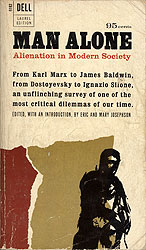 The 50's and 60's were littered with books about alienation: "Modern Man in Search of a Soul"; "The Outsider"; "Man Alone, Alienation in Modern Society"; "The Illusionless Man"; and David Riesman's "The Lonely Crowd" are just a few of the books within easy reach of where I am sitting.
The 50's and 60's were littered with books about alienation: "Modern Man in Search of a Soul"; "The Outsider"; "Man Alone, Alienation in Modern Society"; "The Illusionless Man"; and David Riesman's "The Lonely Crowd" are just a few of the books within easy reach of where I am sitting.
So it is no surprise that the subject would come up on KRAB. Here sociologist David Riesman discusses the alienation caused by the urban-commuter life. In part 4 of his 6 part lecture series, The American Future, he analyzes a time of little houses on the hillside, filled with ticky tacky, all in a row, the Mr Jones who knows something is happening but not what it is. . . . . and all the other symptoms of a society that seemed to have lost its way.
Thanks to the Pacifica Archives, the remaining five lectures will be shared here as well. These are not 15 minute TED talks that end up prescribing the magic technology pill to rectify the mess humans have made of things. Listen and you will learn something.
Recording courtesy Pacifica Radio Archives, from whom it is available for purchase on CD: BB0033.04 The American Future: Suburban sadness
A Tale of Three Cities - Louis E Lomax speaking about race in America - KRAB Jan 30, 1964
Lomax compares and contrasts the cities of Havana, Cuba; Berlin, Germany; and Birmingham, Alabama.
Update: Initially, we were unable to locate the recording that KRAB broadcast in 1964, but had found a substitute at Lawrence University, where they had a tape made in May of 1964, and agreed to digitize it for us. But this summer (2017), when former KRAB production manager Bob ("Patch") Deardorf cleaned out his house before moving, he came across several boxes of tapes he had rescued from a dumpster fate, and hung on to for the last ? years. Besides Aldous Huxley speaking at MIT, Alan Watts, Gary Snyder, and SI Hayakawa, he found the 2nd half of the Louis Lomax tape played on KRAB in Jan of 1964. The tape was made at Saint Louis University Dec 4, 1963, by KETC, a public TV station in Saint Louis, Missouri. It contains half of the Tale of Three Cities speech, starting with the midpoint of Frankfurt, Germany, followed by Birmingham, Alabama, and then a question and answer session.
The following is the introduction to the print copy of the Augsburg address (attached):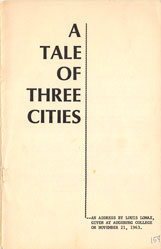
Mr. Louis Lomax was born in Valdosta, Georgia, in 1922. He attended Payne College in Augusta , where he was editor of the college newspaper. Mr. Lomax did additional graduate study at American University, Washington, D.C., and Yale University, New Haven, Connecticut.
Mr. Lomax began his professional career as Assistant Professor of Philosophy at Georgia State College in Savannah. At the age of 22, he turned to writing , joining the staff of the Afro-American. Later he became a staff feature writer for the Chicago America and he has also had articles published in Life, Post, Harper's, The Nation and The New Leader.
In 1959 he joined Mike Wallace's news staff in New York and became the first of his race to appear on television as a newsman.
Mr. Lomax now devotes his time to being a free lance writer and lecturer. He is the author of two best-sellers. His first, "The Reluctant African", won him the coveted Saturday Review Annisfield-Wold Award for 1960. His second book, "The Negro Revolt", is considered by many to be the definitive work on race relations in America today.
Lomax spoke at Temple de Hirsch in Seattle Apr 23, 1963 on the subject "Negroes and Jews: Two Minorities in Search of Liberalism". He also spoke at the Seattle Urban League annual dinner Apr 2, 1964.
Louis E Lomax was a dramatic and inspiring orator. He spoke his mind with insight and intelligence. Any that heard his Tale of Three Cities speech on KRAB in 1964 were fortunate participants in history. What he said then rings true today. He died in an automobile accident in 1970 that some describe as suspicious.
Although we do not have the program guide for Jan 1964, entry, below is the description that ran in the Seattle Times "Radio Notes" of Jan 30, 1964:
 We now have two versions of the speech: The first, below, is an hybridized version, with the first 14 minutes from the Lawrence recording made May 14, 1964, and the remaining 37 minutes from the Saint Louis recording made Dec 4, 1963 and the source of the Jan 30, 1964 KRAB broadcast. During the Q and A section there is about 16 seconds of silence when Lomax went "off record" and muted the microphone.
We now have two versions of the speech: The first, below, is an hybridized version, with the first 14 minutes from the Lawrence recording made May 14, 1964, and the remaining 37 minutes from the Saint Louis recording made Dec 4, 1963 and the source of the Jan 30, 1964 KRAB broadcast. During the Q and A section there is about 16 seconds of silence when Lomax went "off record" and muted the microphone.

![]() Listen now - A Tale of Three Cities - Louis E Lomax speaking at Lawrence and Saint Louis Universities - KRAB Jan 30, 1964 (51:24)
Listen now - A Tale of Three Cities - Louis E Lomax speaking at Lawrence and Saint Louis Universities - KRAB Jan 30, 1964 (51:24)
Recording of first half of the speech courtesy Lawrence University, cited below, LU0001. Recording of second half of the speech and question and answer period courtesy Robert Deardorf and KETC, RD0003.
The Lawrence University recording is missing a few minutes, starting with his arrival in Havana, and ends somewhat abruptly.
Recording courtesy Lawrence University: Louis Lomax, "Tale of Three Cities", 5/14/1964 - University Audio Recordings. LU-AV-001. Lawrence University Archives, Seeley G. Mudd Library, Appleton, Wisconsin.
Emotional Involvement - Dr Ralph Greenson - Rec Oct 16, 1962; KRAB 1963
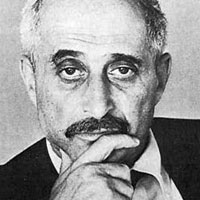 Dr Ralph Greenson, Clinical Professor of Psychiatry, UCLA, discusses the genuine kind of involvement (both healthy and neurotic) and the counterfeit kind (disguised emotional uninvolvement). Recorded by Carlos Hagen at the School for Nursery Years.
Dr Ralph Greenson, Clinical Professor of Psychiatry, UCLA, discusses the genuine kind of involvement (both healthy and neurotic) and the counterfeit kind (disguised emotional uninvolvement). Recorded by Carlos Hagen at the School for Nursery Years.
By the end of the 60's Dr Ralph Greenson was a familiar personality on KRAB. His lectures about "People Who Hate", the "Conflict Between Religion and Psychoanalysis", "Why Men Like War", and "Clinical Varieties of Sexual Apathy" held listeners in rapt attention. And, at some point, we learned he was the psychiatrist to the stars: Marilyn Monroe's psychoanalyst.
This particular program was one of the earliest of Greenson's heard on KRAB. As many program guides from 1963 and 1964 are missing, we do not know the exact date of the first broadcast.
![]() Listen now - Emotional Involvement - Dr Ralph Greenson - Rec Oct 16, 1962; KRAB 1963 - part 1 (31:57)
Listen now - Emotional Involvement - Dr Ralph Greenson - Rec Oct 16, 1962; KRAB 1963 - part 1 (31:57)
![]() Listen now - Emotional Involvement - Dr Ralph Greenson - Rec Oct 16, 1962; KRAB 1963 - part 2 (51:19)
Listen now - Emotional Involvement - Dr Ralph Greenson - Rec Oct 16, 1962; KRAB 1963 - part 2 (51:19)
Recordings courtesy Pacifica Radio Archives, from whom they are available for purchase on CD: BB0323a-b Emotional Involvement – Ralph Greenson
From "A Show of Force", it is A Pub in Connemara - KRAB 1964
What with a new pope and Saint Patrick's day snaking its way toward us, its time for something appropriate.
The WBAI folio (Oct 1964) described it this way: "WBAI's one program series deliberately dedicated to broadcasting against the public interest. Conducted by Richard C. Neuweiler and Bill Alton with help in the thousands, but absolutely no support."
And KRAB guide 126 (Nov 1967) said this: "The first of the satire series that we received from New York (WBAI) which managed to pin everyone wriggling on the wall. With Richard Neustadt, Danuta Wal, Edgar St Vincent Benet, and Geo S Kauffman."
A Show of Force had rousing theme music. Unfortunately I don't have a copy of it.
Catholics, please avert your ears.
![]() Listen now - A Pub in Connemara (7:13)
Listen now - A Pub in Connemara (7:13)
Recording collection of C Reinsch
François-Louis Ganshof, of the University of Ghent, discusses Gregory of Tours - Rec Apr 1, 1964; KRAB Apr 22, 1964, part 1
"Gregory of Tours, an historian of the early Middle Ages will be discussed by François-Louis Ganshof, professor emeritus of the University of Ghent, Belgium, in a public lecture at 8 o'clock Wednesday evening in the University of Washington General Engineering Auditorium." [Seattle Times, Mar 26, 1964]
This is the first of two parts of the evening of Apr 22, 1964 on KRAB. Though we do not have the program guide listing for that date, we have been able to piece it together from clues in the Seattle Times. If you recognize the voice of the announcer, please let me know his name.
Recording courtesy Linda and Leonard Good, LG0017
Two differing opinions about the assassination of President John F Kennedy - KRAB Apr 22, 1964, part 2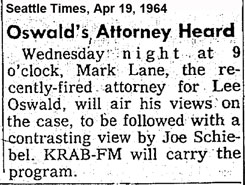
This is part two of the evening of Apr 22, 1964. If you recognize the voice of the announcer, please let me know his name.
The Case Against the Case Against Lee Harvey Oswald - Rec KPFA Feb 1964
"New York attorney Mark Lane delivered this speech in San Francisco in early February at a meeting sponsored by the National Guardian and moderated by S. F. attorney Vincent Hallinan. A question-answer session follows his talk." [KPFA Folio Mar 1964]
In the clipping above The Seattle Times describes Mark Lane as "recently-fired". I had to go to the Apr 2, 1964 New York Times for the details: Mrs Marguerite Oswald said here yesterday that she had dismissed Mark Lane, her New York lawyer. Mr Lane had sought, before the Warren Commission, to clear her son, Lee H Oswald, of the charge of assassinating President Kennedy. Oswald was killed by Jack Ruby in Dallas Nov 24, two days after the assassination. At the Beekman Tower Hotel , Mrs Oswald said she had asked Mr Lane to send her a copy of his report to the commission and to stop any "organized campaign" on behalf of her son through his "Citizens Committee of Inquiry." She received no contributions from an appeal she made in Chicago on March 21 to pay for an office, investigator and a stenographer, she said, because people mistakenly believed she was affiliated with that committee. Last Jan 11 Mr Lane agreed to represent her, free of charge, in collecting information on the shooting of the President and her son and presenting it to the commission. "I consider your work finished, and hereby terminate your representation," Mrs Oswald told him in a letter to committee headquarters, 156 Fifth Avenue. She praised his work. Mr Lane agreed to end the relationship and promised to send Mrs Oswald a copy of his report. "In due course, all of the facts will be presented to the American people despite the fact that your son was denied the right to a trial," he told her. |
Followed by KRAB Commentator Joe Schiebel reading from "The American View, The Making of a Marxist Assassin" - KRAB Apr 22, 1964
Recording courtesy Linda and Leonard Good, LG0017
George Lincoln Rockwell, founder and Commander of the American Nazi Party Speaks at the UW - Rec May 29, 1964; KRAB Jun 10, 1964
Controversy and political correctness
There has always been controversy surrounding the broadcast of programs containing people promoting unpopular ideologies. That is, always since listener supported radio started putting free speech to the test. The KRAB microphone was supposed to be open to virtually any opinion, and KRAB staff put in considerable effort to make sure that people with minority views had an opportunity to share those views over KRAB's airwaves.
Among the first programs put up on the archive was a debate produced in 1935, between a fascist, a socialist, a communist, and a proponent of democracy. At the time of its production it was described by Variety as "one of broadcasting's finest samples of intellectual showmanship". It was first aired on KRAB in 1964 and at least four times thereafter. Perhaps the quaint archaism of the discussion made it less threatening, or it happening before the communist menace had been elevated to boogeyman status, or that it was before fascism became synonymous with genocide, but the program did not generate many complaints.
Other programs, though, did. Ethnic (called "zoo music" by its denigrators), electronic and electro acoustic music probably got more complaints than anything else. The rare political program that got complaints included Wally Butterworth trying to recruit for the Ku Klux Klan, Mississippi Citizen's Council reports promoting segregation, John Birch Society commentaries, and the very rare appearance of the head of the American Nazi Party, George Lincoln Rockwell.
Including these programs in KRAB's schedule was an attempt to bring a full range of ideologies before the listener, including those from the extreme fringes. Toward the end of the 1900's our society has practiced a kind of voluntary self-imposed censorship of what, and how, things are said in public. Much of what has been dropped from public speech are crude, vulgar, and insulting statements expressive of racism, ethnocentrism, and misogyny. In recent years, we have seen, I think, that trying to excise this language from the public’s ears has not reduced the vociferousness of the people that practice it in private, and some might say not hearing vocal extremists use such language has only made us ignorant of their ability to survive and thrive.
This program is an example of how fifty-four years ago the University of Washington, and its faculty and students, responded to a representative of an ideology with which most fundamentally disagreed.
Perhaps what I am trying to say here is that it is not the words we hear we should fear – it is the ones we do not hear, and pretend are not being said in the dark corners of our society.
 The decision to share programs like this with the listener was sometimes not an easy one. In a program guide essay written shortly after this program was recorded, Lorenzo Milam wrote about interviewing Rockwell at his hotel. The essay was reprinted in The Myrkin Papers and again in The Radio Papers. To read the essay - Click here.
The decision to share programs like this with the listener was sometimes not an easy one. In a program guide essay written shortly after this program was recorded, Lorenzo Milam wrote about interviewing Rockwell at his hotel. The essay was reprinted in The Myrkin Papers and again in The Radio Papers. To read the essay - Click here.
And, click here to see what the Seattle Times wrote (May 29, 1964) about the event.
The KRAB announcer at the beginning (and end) of the recording is Nancy Keith. The first speaker is the (unidentified) faculty advisor of the ASUW Political Union, who outlines the UW's policy regarding invited speakers. He then introduces Emanuel Rouvelas, then president of the ASUW Political Union, who in turn introduces Rockwell.
Recording courtesy Leonard and Linda Good, LG0015
America's Town Meeting of the Air (ATMA): Which Way America - Fascism, Socialism, Communism, Democracy? - May 30, 1935, KRAB - Aug 18,1964
From 1935, one of radio's most popular programs, from Town Hall in New York. 'Four prominent Americans' advocate four courses for the future governing of the nation: fascism, socialism, communism, democracy. The speakers are: Lawrence Dennis, associate editor of the Awakener, speaking for fascism; Norman Thomas, Socialist Party head, speaking for socialism; A.J. Muste, chairman of the Worker's Party, speaking for communism; and Raymond Moley, of Columbia University, speaking on behalf of democracy. The moderator is George B Denny Jr.
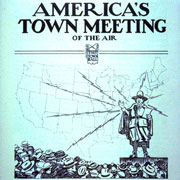 Variety described this as "one of broadcasting's finest samples of intellectual showmanship", and went on to say "As a contrast to the ranting and slinging of mud to which listeners have been accustomed the past several months, last Thursday night's gathering of four exponents of four different political and economic systems proved not only singularly refreshing, but that differences of opinion and belief can still be soberly and safely exchanged in public." (Click here for the entire Jun 5, 1935 review in Variety).
Variety described this as "one of broadcasting's finest samples of intellectual showmanship", and went on to say "As a contrast to the ranting and slinging of mud to which listeners have been accustomed the past several months, last Thursday night's gathering of four exponents of four different political and economic systems proved not only singularly refreshing, but that differences of opinion and belief can still be soberly and safely exchanged in public." (Click here for the entire Jun 5, 1935 review in Variety).
Eighty years ago it seems the American radio listening public had attention spans longer than 3 minutes, and a patient tolerance for listening to very divergent opinions that is almost impossible to imagine today. This program was proof that Lorenzo Milam's idea of "free-forum" radio could be relatively successful even during times of national conflict. Further, who could imagine that it could have happened on the commercial NBC Blue network. Unfortunately the ideals of ATMA did not survive the first volleys of the cold war. David Goodman, in Programming in the Public Interest, writes, "In 1948, on the five hundredth edition of ATMA, the program returned to the question posed on the first broadcast [above]. But this time there was no possibility of having communists or fascists speak for themselves. Denny made it clear in his introduction that communism and fascism were forms of totalitarianism and that 'we are not impressed by the propaganda demands of the advocates of totalitarianism to use the principles of democracy to advance the cause of a form of government which would destroy those principles.' The speakers chosen to talk about communism and fascism were vigorous opponents of those doctrines."
For the most complete story of America's Town Meeting that I could find, see Programming in the Public Interest by David Goodman published in NBC: America's Network, Michele Hilmes, Editor.
KRAB's copy of the 1935 broadcast probably came from WBAI which rebroadcast the Town Hall debates in the early 1960's. Between 1964 and 1979 KRAB broadcast it at least five times. About 18 minutes of this was recovered from a recording made during the Oct 1971 Marathon by Mark Apland. To get the complete program, I tracked it down in the National Archives.
A Ku Klux Klan enlistment recording with Wally Butterworth - KRAB Nov 18, 1964
A talk with interviews by Wally Butterworth of the Atlanta branch of the Klan; it's rather strong, and tries to show how civil rights workers violate property rights for their own ends; it is followed by the Klan's view of history of the United States since the civil war-and how domination by Jews and Catholics has caused most of our present-day problems.
![]() Listen now - Wally Butterworth speaks for the KKK (48:48)
Listen now - Wally Butterworth speaks for the KKK (48:48)
Soviet Press and Periodicals with William Mandel - KRAB 1964 to 1974
At the beginning of 1958 William Mandel started producing a program on KPFA called "Russian Weeklies". Within a month it was renamed "Soviet Press and Periodicals", and stayed as such until the Pacifica-KPFA Troubles of 1995, when its run ended abruptly. KRAB started airing Soviet P&P in 1964, and it continued until Nov of 1974, when KRAB could no longer afford Pacifica's modest charge.
We have not yet found a copy of one of the Soviet P&Ps aired on KRAB, but we do have something else that was incorporated into several other Pacifica programs about the 1960 House Un-American Activities Committee hearings held in San Francisco that got aired on KRAB. It is Mandel's response to being subpoenaed - his testimony in which he let the Committee know exactly what he thought of them.
In 1999 Mandel's autobiography, "Saying No to Power", was published. It is available through the usual places. Prior to Bill's passing in 2016, we had linked to his web site, but the site is gone now. Here though is a statement he wrote about "Saying No to Power".
John Whiting has a great two hour conversation with Mandel on his site, MyKPFA.
![]() Listen now - William Mandel before the House Un-American Activities Committee May 13, 1960 (12:57)
Listen now - William Mandel before the House Un-American Activities Committee May 13, 1960 (12:57)
Recording courtesy William Mandel
The art form of montage:
Jeremy's Classic Tape: I told you I love you, now get your finger out of my ear - KRAB 1965
This morning (December 24, 2012) Democracy Now had an extended interview with John Lewis (member of Congress former chair of SNCC) from last October, and this prompted me to want to share one of the few extant recordings of a program from KRAB, and build this web site. This contains voice or excerpts of creations of Harry Partch, Henry Jacobs, "Professor" Irwin Corey, Louis E Lomax, Wally Butterworth, George Lincoln Rockwell, Timothy Leary, Krishnamurti(?), Alan Watts, Vladimir Ussachevsky, The Yardbirds, Rolling Stones, Joan Baez, and others. Can you identify them?
Thanks to a reader's email, the date associated with this program has been corrected (from 1964) to 1965. It was first (?) aired 8:00 pm Nov 14, 1965.
![]() Listen now - Jeremy's Classic Tape (34:05)
Listen now - Jeremy's Classic Tape (34:05)
Recording collection of C Reinsch
The Story of Greenwood Mississippi - KRAB Mar 25, 1965
THE STORY OF GREENWOOD, MISSISSIPPI (R) - Bob Moses, Medgar Evers, Dick Gregory, mass meetings, Freedom songs, citizens and demonstrators produced by Guy Carawan (Folkways)
Folkways records were almost always unusual. Sleeves of heavy cardboard, sometimes with a cardboard divider inside that made the package stiffer, and heavy vinyl made them even more substantial, a front cover photograph, minimal notes on the back cover, and a pamphlet inside with photographs and extended "liner" notes, all made it easy to tell you were holding a Folkways recording.
But it was the content that made them really stand out as not the usual LP fare. Sometimes it was folk, ethnic, traditional, or experimental contemporary music. Or, there were the spoken word, poetry, and documentary montages about the free speech movement in Berkeley or the civil rights movement (then) in the South. They were audio expressions of arts, events and times that were passing before us faster than we could comprehend. This is being shared here in the hope people will be reminded of the way it was, what the participants in the civil rights movements of the 1960s risked and accomplished, and what is still before us.
The credits on the album tell us that "The Story of Greenwood, Mississippi" was recorded and produced by Guy Carawan. In 1963 he had done a similar montage, "Birmingham, Alabama, 1963: Mass Meeting", Folkways FD5487. Both recordings articulate, in music and speech, the pain, hope and inspiration of a movement that we know now is incomplete.
On the death of Guy Carawan in 2015, the New York Times wrote this:
"The son of Southern parents, Guy Hughes Carawan Jr. was born on July 28, 1927, in Santa Monica, Calif. His mother was a poet, his father an asbestos contractor who later died of asbestosis. After Navy service stateside at the end of World War II, the younger Mr. Carawan earned a bachelor’s degree in mathematics from Occidental College in Los Angeles, followed by a master’s in sociology from the University of California, Los Angeles."
"Around this time, Mr. Carawan, who sang and played the guitar, banjo and hammered dulcimer, became deeply interested in the use of folk music to foster social progress. But Wayland Hand, a distinguished folklorist with whom he studied at U.C.L.A., warned him against mixing folk music with activism — they had been combined to devastating effect, Professor Hand pointed out, in Nazi Germany."
![]() Listen now - The Story of Greenwood, Mississippi as heard on KRAB Mar 25, 1965 (46:48)
Listen now - The Story of Greenwood, Mississippi as heard on KRAB Mar 25, 1965 (46:48)
In 1999 NPR produced a short (19 minute) documentary about "The History Of 'We Shall Overcome", and on the death of Guy Carawan in 2015 rebroadcast an abbreviated version. You can hear both at The History Of 'We Shall Overcome'
One can purchase a copy of The Story of Greenwood, Mississippi without pops, clicks and scratches at Smithsonian Folkways
NEW MAR 2021: The Writer Speaks with Walter Starkie - KRAB Apr 1, 1965
THE WRITER SPEAKS - Walter Starkie, author of "Raggletaggle", student of gypsies, and sometime teacher at Trinity College, Dublin, and the U of Cal., recounts some experiences.
When Duke Hayduk introduces this program he says that it is the 11th program in a series from the New American Library. Interestingly, when I contacted New York University's Fales Library, which has an archive collection of publications and other documents of the New American Library, they had no record of them distributing radio programs. It wasn't until I did a search of the Library of Congress was I able to confirm what I thought we already knew. The LOC has 13 recordings from The Writer Speaks series, including the one we are sharing here. I do not remember seeing recordings from New American Library, so it is possible they were on loan and were returned.
Our collection of program guides from 1965 is incomplete, but we were able to find these other Writer Speaks programs in guides we do have: James Jones, Feb 25; Erskine Caldwell, Mar 4; C P Snow, Mar 25; Theodore White, Apr 8.
From a biographical sketch of Walter Starkie by James Whiston: "In 1927 Starkie became a member of the board of the Abbey Theatre, joining W. B. Yeats, Lady Gregory, and Lennox Robinson as the fourth member of that élite group. Yeats valued him for his classical scholarship; it helped the ecumenical balance of the board (which recently had received its first Irish free state subvention) that Starkie was a Catholic; and Lady Gregory reckoned that he would be a ‘compliant’ colleague. Nonetheless, Starkie was the only one of the board who voted in favour of producing Sean O'Casey's expressionist The Silver Tassie in 1927. His place as a footnote to Irish theatrical history may, however, arise from another rejection by the board in 1928, that of Denis Johnston's modernist play The Old Lady Says ‘NO’!, originally entitled Shadowdance. Starkie was evidently charged with giving Johnston the bad news, and he wrote in his spindly handwriting on the draft title-page the five words (referring to Lady Gregory) that Johnston then used to retitle the play before putting it on at Dublin's Gate Theatre, to considerable critical acclaim."
![]() Listen now - The Writer Speaks with Walter Starkie - KRAB Apr 1, 1965 (26:46)
Listen now - The Writer Speaks with Walter Starkie - KRAB Apr 1, 1965 (26:46)
Recording courtesy Glenn Austin, ga0001
Professor Simon Ottenberg talks about the Background of the American Negro - KRAB Nov 1, 1965
A program prepared by University of Washington professor of anthropology Simon Ottenberg. Dating from 1965 and relating the ethnic and cultural history of the American Blackman.
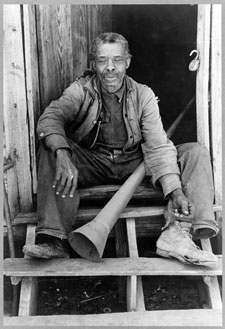 The italicized text above comes from the program guide listing for the rebroadcast of this program Aug 27, 1968. Though Seattleites seem to favor a self-image of liberalism, as the 1960's progressed many were increasingly challenged by a civil rights movement that gradually brought both unconscious and conscious attitudes and prejudices to the surface. What the white city leaders took for positive and peaceful relations with their black neighbors were revealed to not be so benign. And the whites were puzzled.
The italicized text above comes from the program guide listing for the rebroadcast of this program Aug 27, 1968. Though Seattleites seem to favor a self-image of liberalism, as the 1960's progressed many were increasingly challenged by a civil rights movement that gradually brought both unconscious and conscious attitudes and prejudices to the surface. What the white city leaders took for positive and peaceful relations with their black neighbors were revealed to not be so benign. And the whites were puzzled.
Here Professor Ottenberg provides a cultural anthropolgist's perspective on the catastrophic changes faced by the Africans enslaved and brought to America, how they endured and survived the ordeals they encountered, and how white attitudes persisted. Note, this program was recorded shortly after the 100th anniversary of the end of the Civil War, and six years before the last documented surviving person born into slavery died: Sylvester Magee (May 1841 - Oct 15, 1971). In 1965 there were, no doubt, many children and near descendents of former slaves still alive.
Willis Winn, on the right was born into slavery, and photographed by Russell Lee in 1939 as part of the Federal Writer's Project (WPA). Photo from Library of Congress. He is holding a horn used to call slaves. It is remarkably similar to a vuvuzela, a contemporary version of a Kudu Horn which was used to call people together.
 More of Simon Ottenberg's programs can be found on the page for his series From African Periodicals.
More of Simon Ottenberg's programs can be found on the page for his series From African Periodicals.
Updated Jun 2021: When we first shared this program it came from a recording held by the Jack Straw Foundation. It was missing a short part of Si Ottenberg's introduction, which we discovered when comparing it to a recording in the University of Maryland NFCB Collection. So now we are sharing here the slightly longer, complete, version.
Recordings courtesy University of Maryland Special Collections and University Archives, collection of the National Federation of Community Broadcasters (NFCB) - umd-bcast-072461
Below is the Jack Straw version.
Recording courtesy Jack Straw Foundation, JSF PA0763
Dr Jacob Bronowski interviewed by Jonathan Gallant - KRAB December 2, 1965 (recorded Nov 9, 1965)
DR. JACOB BRONOWSKI - The author of The Meaning of Life, thinker and speaker in the recent series of programs, "The Identity of Man", is interviewed by Dr. Jonathan Gallant. Dr. Bronowski came to Seattle recently as the first Aaraard lecturer at the University of Washington (R)
In this conversation, Bronowski and Gallant discuss the natures of machine and man, the learning process, poetry, the logic of history, and Bronowski's chess-playing machine. Bronowski is several times taken aback by Dr Gallant's questions.
Dr Jonathan Gallant is now an Emeritus Professor of Genome Science, University of Washington.  Over the years Dr Gallant produced numerous KRAB programs exploring science and the philosophy of science, as well as commentaries, and obscurantist musical diversions. He is one of the founders of KRAB.
Over the years Dr Gallant produced numerous KRAB programs exploring science and the philosophy of science, as well as commentaries, and obscurantist musical diversions. He is one of the founders of KRAB.
![]() Listen now - Dr Jacob Bronowski interviewed by Dr Jonathan Gallant (60:10)
Listen now - Dr Jacob Bronowski interviewed by Dr Jonathan Gallant (60:10)
Recording courtesy of the Jack Straw Foundation, JSF inv PA0862
Publishing Pornography and Literature - A Live Panel Discussion - KRAB Nov 30, 1965
Participants will make a stab at a legal and social definition and if there's any time left they hope to discuss its effect on the public and its place in art. They will include: John Collins of the University Press, P. J. Doyle of The Seattle Public Library, John Spellman, attorney, and M. A. Muckerheider of the King County Salacious Literature Committee.
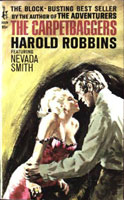 Not included in the program guide description was the moderator Professor Luvern V Rieke of the UW Law School. The announcer for the evening was Pat Melgard.
Not included in the program guide description was the moderator Professor Luvern V Rieke of the UW Law School. The announcer for the evening was Pat Melgard.
Also note that during the mid-1960s there were two prominent Spellmans in Seattle appearing on KRAB. In this program is heard attorney John D Spellman, who by 1965 had already run once for mayor of Seattle, would shortly become King County Commissioner, and in 1976 governor. The other, Professor John W Spellman of the UW Department of History, was a frequent commentator.
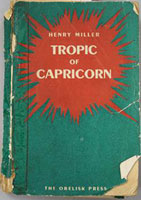 P J Doyle, of the Adult Education Department of the Seattle Public Library, was regular producer of programs from 1965 through 1971, reading from and/or commenting on books, interviewing and participating in panels.
P J Doyle, of the Adult Education Department of the Seattle Public Library, was regular producer of programs from 1965 through 1971, reading from and/or commenting on books, interviewing and participating in panels.
The King County Salacious Literature Committee was a creation of Prosecutor Charles O Carroll in 1952. For the next 18 years it met monthly to examine salacious, obscene, or pornographic materials, but in 1970 Carroll stated his committee had been losing ground ever since it was started.
This program was scheduled to run for 90 minutes (8:30 to 10:00), but for its first rebroadcast was only scheduled for 75 minutes (8:00 to 9:15), and for its second rebroadcast 105 minutes (9:45 to 11:30). So it would seem, coming in at 101 minutes, this recording is near complete.
Recordings courtesy University of Maryland Special Collections and University Archives, collection of the National Federation of Community Broadcasters (NFCB) - umd-bcast-072327, umd-bcast-072331, umd-bcast-072332, umd-bcast-072333
Letter from England - Michael Scarborough reporting from Riddlesden, Keighley, Yorkshire, England - KRAB 1966 - 1971
Attention, please
Letter From England now has its own pages. You will find it at the link below
www.krabarchive.com/krab-programs-letter-from-england-with-michael-scarborough.html
Age of Involvement - Timothy Leary talks of Mexico, Texas, Law, and Order - WBAI Apr 26, 1966; KRAB 1966
DR. TIMOTHY LEARY the ex-Harvard Professor who was recently given a 30-year sentence and fined $30,000, in Texas for carrying Marijuana, is interviewed by Dennis Wholey. [WBAI folio]
It seems the KRAB program guide listing this is missing, so we do not know the exact date of broadcast, and we have taken the description above from WBAI's folio.
Age of Involvement was hosted by Dennis Wholey and produced by Steve Baran. "Each program in this new (Jun 1965) bi-weekly series will explore the concept of responsibility and commitment in a specific phase of our society today. On the opening program, host Dennis Wholey and a panel of experts will discuss man's new awareness of his responsibilities and investigate his motivations to get involved."
Recording made off the air. At the end of the tape the announcer is David Rowland.
Recording courtesy Linda and Leonard Good, LG00111
A Memorial for Lenny Bruce at the Judson Memorial Church - KRAB Jan 20, 1967, WBAI Aug, 12, 1966
A CRAZY, LOUD AND DISORGANIZED LENNY BRUCE MEMORIAL SERVICE, at Judson Memorial Church in NY on Aug 12, 1966 . Paul Krassner heads a show of hippies, crackpots and super far-outers who gather to make a big scene for the late comedian. WBAI
We would receive program guides (they called them "folios") from KPFA, KPFK and WBAI, from which we would select programs that appealed to us. This was one of them. The attendees included Allen Ginsberg, Peter Orlovsky, Charlie Haden, Jean Shepherd, and the Fugs. Click here for Dick Schaap's remembrance of Lenny and comments on the memorial.
![]() Listen now - Lenny Bruce Memorial at the Judson Memorial Church - KRAB Jan 20, 1967 (76:03)
Listen now - Lenny Bruce Memorial at the Judson Memorial Church - KRAB Jan 20, 1967 (76:03)
Shared here courtesy of the Pacifica Radio Archives and WBAI. CD copies of this are available from the PRA.
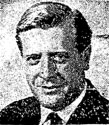 World Affairs - Geoffrey Johnson Smith interviewed by Geoffrey Hewings - KRAB Apr 1967
World Affairs - Geoffrey Johnson Smith interviewed by Geoffrey Hewings - KRAB Apr 1967
The Vice-Chairman of the British Conservative Party, Geoffrey Johnson Smith (at right) is interviewed at KRAB by Geoff Hewings
![]() Listen now - World Affairs - Geoffrey Johnson Smith interviewed by Geoffrey Hewings (29:40)
Listen now - World Affairs - Geoffrey Johnson Smith interviewed by Geoffrey Hewings (29:40)
Recording courtesy Geoffrey Hewings
Margaret Mead speaking about Today's Youth, recorded at Bellevue Community College Apr 6, 1967
Subjects range from long hair to marriage, and the problems of the "new and different" responsibilities of youth. The speech is about 40 min long - the rest is questions and answers. Although it is written on the tape label that this was broadcast July 31, 1978, it does not appear to have been scheduled for that day as there is no mention in the program guide.
 Margaret Mead was a ground breaking anthropologist who applied the insights of her profession to contemporary lifestyles and mores.
Margaret Mead was a ground breaking anthropologist who applied the insights of her profession to contemporary lifestyles and mores.
![]() Listen now - Margaret Mead speaking about Today's Youth - 1967 (85:52)
Listen now - Margaret Mead speaking about Today's Youth - 1967 (85:52)
Recording courtesy of the Jack Straw Foundation, JSF inv P018
Aldous Huxley speaking about the Visionary Experience, KRAB May 1, 1967
Aldous Huxley: The Visionary Experience. In a talk in 1962 at Monterey Peninsula College, the author talks about the "luminous other world of ideas," and the traditional and new ways man has found for coming closer to totally knowing that world. KPFA (R)
As noted above, KRAB broadcast a recording of this speech received from KPFA. The version shared here comes from an LP entitled “Visionary Experience: A Series Of Talks On The Human Situation” produced by Laura Huxley, and also recorded in 1962. Exactly where it was recorded is not entirely clear. One source says it was at MIT, but the album jacket refers to "The Lecture Hall", which may point to it being from the Los Alamos presentation.
![]() Listen now - Aldous Huxley speaking about the Visionary Experience (52:27)
Listen now - Aldous Huxley speaking about the Visionary Experience (52:27)
The First Principle of Racism - John Howard Griffin at Seattle Pacific College - Rec May 12, 1967; KRAB Jun 8, 1967
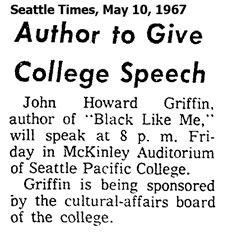 THE FIRST PRINCIPLE OF RACISM. John Howard Griffin, author of BLACK LIKE ME, talks to a Seattle Pacific College* audience about his long experience with the roots of racial hate.
THE FIRST PRINCIPLE OF RACISM. John Howard Griffin, author of BLACK LIKE ME, talks to a Seattle Pacific College* audience about his long experience with the roots of racial hate.
In the Findings of Fact from KRAB's 1970 FCC hearing it is noted that Robert W Means, a KRAB listener who testified at the hearing, also was a volunteer who taped "programs for broadcast over the station". One of the programs he taped was a speech by John Howard Griffin. It had to be this one.
Griffin had been scheduled to appear in Seattle in Apr 1966, but that visit was cancelled due to illness.
This is a program that I have wanted to share here since starting the Archive project. The original tape in the JSF collection seems to suffer from severe sticky-shed syndrome, and could not be digitized.
More about Griffin can be found online at the BBC: Exposing the colour of prejudice, in the Guardian: Rereading Black Like Me, and in the Washington Post: John Howard Griffin Took Race All the Way to the Finish. The BBC article includes a discussion about recent (2009) incidents involving blackface impersonation, and says these incidents remind "us that Griffin's experiment was perhaps the only occasion on which one man assumed the race of another with noble intent."
* Seattle Pacific College is now known as Seattle Pacific University.
Recordings courtesy University of Maryland Special Collections and University Archives, collection of the National Federation of Community Broadcasters (NFCB) - umd-bcast-072469 and umd-bcast-072470
Changes, also known as The Houseboat Summit - Watts, Leary, Snyder, and Ginsberg look into the future and see their past - KRAB Jul 18, 1967
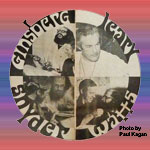 Like all well organized, meaningful social movements, the new Underground, the "Love Revolution," has its leaders . In calling a hippie Summit, you couldn't overlook Alan Watts, Alan Ginsberg, Timothy Leary and poet Gary Snyder. In this discussion, which was printed in The San Francisco Oracle, they talk about modern youth, the psychedelic scene and the possibility of hippy utopias.
Like all well organized, meaningful social movements, the new Underground, the "Love Revolution," has its leaders . In calling a hippie Summit, you couldn't overlook Alan Watts, Alan Ginsberg, Timothy Leary and poet Gary Snyder. In this discussion, which was printed in The San Francisco Oracle, they talk about modern youth, the psychedelic scene and the possibility of hippy utopias.
Recorded in Sausalito on the houseboat Vellejo in Feb of 1967, this was evidently put together by the San Francisco Oracle newspaper, which transcribed the recording and published the transcript shortly thereafter. The recording was produced for radio (KPFA) by Duncan Ray. It was aired on KRAB at least three times, Jul 18, 1967, Feb 6, 1969, and Dec 8, 1972
Recording courtesy Pacifica Radio Archive, from whom a clean copy of this program is available.
Germany and the Germans, a Lecture by Thomas Mann at the Library of Congress - Rec May 29, 1945; KPFA Oct 14, 1961; KRAB Dec 6, 1967
THOMAS MANN IS A FELLOW OF THE LIBRARY OF CONGRESS
AND THE FOLLOWING IS THE TEXT OF AN ADDRESS DELIVERED
BY DR. MANN IN THE COOLIDGE AUDITORIUM IN THE LIBRARY OF
CONGRESS ON THE EVENING OF MAY 29, 1945.
[The text immediately above comes from the frontispiece of "Germany and the Germans", the text copy of the lecture presented here.]
This was the third of Thomas Mann's lectures at the Library of Congress between 1942 and 1949. It appears that in 1960 tape recordings were made from the glass transcription disks, and KPFA aired the series of five lectures in 1961. Later, KRAB "borrowed" tapes from KPFA, and a copy was shared with KRAB Nebula stations.
Here we are, in the 21st millennium, witnessing the philosophies of mid-20th century German populism and nationalism spreading to those nations that once described them as abhorrent. And here is Thomas Mann in 1945, a proud German, trying to make sense of the madness that possessed his country:
At times, particularly when contemplating German history, one has the impression that the world was not the sole creation of God but a cooperative work with someone else. One would like to ascribe to God the merciful fact that good can come from evil. But that evil so often comes from good, is obviously the contribution of the other fellow."
The introduction is by Archibald MacLeish.
Recordings courtesy University of Maryland Special Collections and University Archives, collection of the National Federation of Community Broadcasters (NFCB) - umd-bcast-072249
Malcolm X with The Ballot or the Bullet - KRAB Dec 26, 1967 and Feb 21, 1968
The KRAB program guide listings for these two broadcasts provide little more than the title above, with the exception that the Feb 21, 1968 listing asserts the speech was delivered in San Francisco. I have found no evidence confirming that assertion. As best I can determine the speech was delivered three times, although FBI documents cite frequent references to ballots and bullets at other speaking engagements.
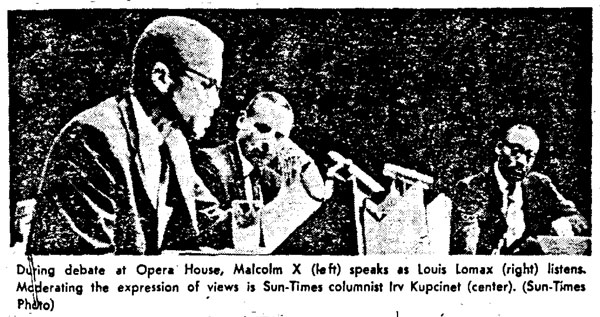
On Apr 3, 1964 at the Cleveland, Ohio, Cory Methodist Church at a symposium sponsored by Cleveland chapter of CORE, where Malcolm X also debated Louis E Lomax. While I have not located audio of this version, the transcript begins with an acknowledgement of "Brother Lomax", and he announces the topic as "The Negro Revolt, and Where Do We Go From Here?". "The Negro Revolt" is the title of Louis E Lomax's book published in 1962. Malcolm X and Louis Lomax appeared together on a number of occasions, debating and discussing strategy and philosophy of advancing the movement for civil rights and justice for African Americans. The photograph above is from another occasion and is found in (FOIA) released FBI records. This speech was delivered 26 days after Malcolm split from the Elijah Muhammad and the Nation of Islam.
Apr 12, 1964 at the Detroit, Michigan King Solomon Baptist Church. This version begins with an acknowledgement of the moderator, followed by Reverend (Albert) Cleage of Detroit's (then named) Central Congregational Church. There are on the internet some versions of a transcript that insert Lomax in the acknowledgements. He may have been there, but he is not named in our recording. Otherwise, the recording we have matches the published transcripts of the Apr 12 speech.
On Apr 13 Malcolm X left for Frankfurt, Germany, en route for his pilgrimage to Mecca and travels in Africa and Europe, from which he returned Nov 24, 1964.
According to a redacted FBI memo of Feb 2, 1965, Malcolm delivered the Ballot or the Bullet speech again on Jan 31, 1965 at the Audubon Ballroom in NY for a rally for the Organization of Afro-American Unity (He founded the OAAU in Jun of 1964).
On February 21, 1965, at the Audubon Ballroom, Malcolm X was assassinated.
The first broadcast I have found on Pacifica (WBAI) was Sep 9, 1967, as part of the series entitled "Malcolm X Speaks". The program was produced for WBAI by Charles Hobson and Roberta Kurland, but the source of the recording is not disclosed. The copy of "The Ballot or the Bullet" in the Pacifica collection (BB3101) appears to be almost the same as ours, though it begins with the greeting to "brothers and sisters", the applause at the end goes a little longer, and ends with Malcolm asking people to take their seats. It would seem safe to assume that KRAB's copy came from Pacifica, and that is what is shared here.
![]() Listen now - Malcolm X - The Ballot or the Bullet - KRAB Dec 26, 1967 (52:48)
Listen now - Malcolm X - The Ballot or the Bullet - KRAB Dec 26, 1967 (52:48)
Recording collection of C Reinsch
If you are interested in acquiring a copy of this recording, as well as nine other recordings of Malcolm X, it can be found in the Pacifica Radio Archives WBAI collection, PZ0971. Or, you might be able to get a copy of just The Ballot or the Bullet by asking for BB3101.
An hour of KRAB on a Monday evening - KRAB Jan 1968
This is an example of what KRAB “sounded like”: an anonymous voice announces the next program – long pause – Robert Sund reads from Ring Lardner's “Round-Up” – long pause - the voice announces a commentary by Jean Andre – long pause – Jean Andre expresses her opinion – long pause – voice announces music – and on…..
We did not call it “dead air”. The spaces between the programs were intended to allow the listener to breathe, to think about what they had just heard, and adjust to what was coming next. Well, that was the theory. Sometimes, though, they were a little too long, and the rustling of papers could be downright irritating.
That other sound you hear, are the blowers in the transmitter keeping it cool, oh so cool.
![]() Listen now - An hour of KRAB on a Monday evening (67:28)
Listen now - An hour of KRAB on a Monday evening (67:28)
Recording courtesy Bob West
Tibetan culture - KRAB Feb 2, 1968

......at least that 's what is recorded in program guide number 132 for February 2, 1968. One explanation for this program may be: By the mid-1960's the Tibetan diaspora had come to Seattle and a small community had taken up residence here. Their proximity presented a unique opportunity for those interested in Tibetan culture, and KRAB presented an opportunity for Tibetans agreeable to sharing their experiences and traditions. So, someone organized a panel discussion, which is mostly in Tibetan, with a translator who sounds a little like Alan Arkin. A highlight is when a panelist, describing how Tibetan opera differs from Chinese opera, begins to sing an impromptu example, and is quickly joined in the recital by several other members of the panel. Lorenzo is heard giving out the phone number so that listeners may call in with questions. Offered here is the surviving excerpt of the program.
![]() Listen now - an evening by with and about Tibetans (33:29)
Listen now - an evening by with and about Tibetans (33:29)
Recording courtesy Bob West
The Anniversary of the Death of Malcolm X Murdered on Sunday Feb 21, 1965 - KRAB Feb 21, 1968
The text in bold italic below comes from KRAB program guide number 133 for Feb 21, 1968:
|
MY ACE OF SPADES
MALCOLM X SPOKE TO ME and sounded you
Malcolm X said this to me & THEN TOLD you that!
Malcolm X whispered in my ears but SCREAMED on you!
Malcolm X smiled at me & sneered at you
Malcolm X praised me & thus condemned you
Malcolm X made me proud & so you got scared
Malcolm X told me to HURRY & you began to worry
Malcolm X sang to me but GROWLED AT YOU!!
Malcolm X words freed me & they frightened you
Malcolm X tol' it lak it DAMN SHO' IS!!
Malcolm X said that everybody will be FREE!!
Malcolm X told both of us the TRUTH . . . . . .
now didn't he?
Ted Joans
5:30 The life of Malcolm X read by Gary Wingert
5:45 Anthony Ngubo, a black south African,
commentary repeated from febuary 8
6:15 music from Moslem Africa
6:30 H. RAP BROWN speaking in NYC WBAI
7:30 THE BALLOT OR THE BULLET Malcolm X speaking in San Francisco KPFA
8:30 COMMENTARY: Larry Gossett
9:00 EAR TO THE GROUND; Lowell plays Jazz, rock blues, soul, music that is happening now
10:00 BLACK POWER IN SEATTLE, a live panel discussion. The members are Billy Jackson, Aaron and John Dickson, Larry Gossett (all from SNCC), Aaron Dumas, playwrite & Sonny Buxton, Manager of KYAC. open end
(The above text comes from Guide Nbr 133, where spelling frequently went awry - It has not been corrected, but the notes below have been.)
The programming on the evening of Feb 21, 1968 was put together in memory of Malcolm X, who had been assassinated three years before. Only two programs have been recovered so far: Malcolm X's Ballot and the Bullet speech was posted last month.
Appearing that evening were the following:
Gary Wingert, reading from The Life of Malcolm X, had recently been appointed station manager by the Board of Directors, as Lorenzo slowly separated from KRAB operations.
Anthony Ngubo did several KRAB commentaries, went on to teach at MiraCosta College, and seems to have been puzzled by "racial contradictions within American Society".
Larry Gossett participated in a couple of programs at KRAB, was a key founder of the UW Black Student Union, worked on the creation of the UW's Office of Minority Affairs, and has been a member of the King County Council since 1993. (See UW Seattle Civil Rights Project)
Lowell Richards was a regular jazz music program host, KRAB supporter, and a Defender of the Right of the Black Panther Party to Exist. We do not know the details of that night's program, but it is not hard to imagine what he might have done.
Billy Jackson was a member of the Black Panthers.
Aaron Dixon was a key player in the formation of the Black Student Union, and Seattle chapters of SNCC and the Black Panther Party. His autobiography My People Are Rising: Memoir of a Black Panther Party Captain (2012) uses the cover of the Oct 1968 Seattle Magazine (above) on its cover. (See UW Seattle Civil Rights Project)
Aaron Dumas was a writer, poet and playwright. Two of his works (Three Acts In A Restaurant/1970, and Poor Willie/1971) were produced at Black Arts West. What has become of him seems to be something of a mystery. (See also HistoryLink)
Sonny Buxton worked in Seattle at KZAM and KYAC, and is still doing radio, now at noncommercial KCSM, at the College of San Mateo. For a time he co-owned a jazz club in San Francisco, "Jazz at Pearl's" (See The day the music died)
Here is the 6:30 to 7:30 program:
H. RAP BROWN speaking in NYC WBAI
Julius Lester, Director of Photography for SNCC and WBAI program host, and H Rap Brown, National Chairman of SNCC, speaking at a rally entitled "Vietnam and Black America" at the Village Theatre in New York City on Aug 29, 1967. The program, recorded by WBAI, was originally broadcast on KRAB Dec 26, 1967. Ends with "See you all in Washington on October 21st" (for the Pentagon levitation).
![]() Listen now - Julius Lester and H Rap Brown in NY Aug 29, 1967 - KRAB Dec 26, 1967 (49:05)
Listen now - Julius Lester and H Rap Brown in NY Aug 29, 1967 - KRAB Dec 26, 1967 (49:05)
Recording courtesy Pacifica Radio Archives, from whom a copy (BB4400) can be acquired inexpensively
The Last Message of Malcolm X - Rec Feb 14, 1965
There are a number of program guide entries for Malcolm X where it is difficult to determine the title and date of the speech. Because of this we cannot say for certain if the next recording was heard on KRAB, but it seems possible. In trying to identify the program aired on Sep 2, 1972, I wrote to Dwight Threepersons who had loaned the original tape aired on that night to KRAB. He responded by sending to me a copy of Malcolm X (El Hajj Malik El Shabazz) speaking at the Ford Auditorium in Detroit Feb 14, 1965, the day after his house was bombed and one week before his assassination. Here is The Last Message of Malcolm X.
![]() Listen now - The Last Message of Malcolm X - (85:58)
Listen now - The Last Message of Malcolm X - (85:58)
Recording courtesy Dwight Threepersons, DT0001
Ashley Montagu: Race, Racism and Possible Solutions - KPFA Mar 11, 1968; KRAB Mar 29, 1968
The anthropologist and writer speaking at the First Unitarian Church in San Francisco on the 5th of November, 1967. (KPFA-FM, Berkeley)
"My job in life is to afflict the comfortable and comfort the afflicted."
"There is not a race problem. There is not a Negro problem in this United States - There is a white problem - It is the white man."
On the occasion of his death, Nov 26, 1999, the New York Times wrote:
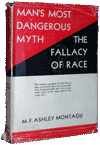 Mr. Montagu wrote more than 60 books, ranging from an account of the life of Joseph Merrick, known as ''The Elephant Man,'' to lighter works such as a book on the history of swearing.
Mr. Montagu wrote more than 60 books, ranging from an account of the life of Joseph Merrick, known as ''The Elephant Man,'' to lighter works such as a book on the history of swearing.
Mr. Montagu became a controversial figure in the 1950's when he suggested there was scientific evidence of race and gender equality. ("Man's Most Dangerous Myth: The Fallacy of Race", 1942)
He recently published a revised version of his 1953 book, ''The Natural Superiority of Women,'' in which he argued for complete equality between men and women.
Between 1968 and 1984, at least five of Montagu's lectures were broadcast on KRAB. As noted above, this one came to KRAB from KPFA. It is now part of the NFCB Collection at the University of Maryland.
Recordings courtesy University of Maryland Special Collections and University Archives, collection of the National Federation of Community Broadcasters (NFCB) - umd-bcast-072466 and umd-bcast-072467
NEW MAR 2021: James Bevel at the American Friends Service Committee - Rec Feb 25, 1968; KRAB Apr 7, 1968
JAMES BEVEL AT THE AMERICAN FRIENDS SERVICE COMMITTEE, on the 25th of February. The complete seminar will be played; the series of events is something like this: First, a keynote speech by J. Bevel, followed by questions, which in turn is followed by a panel discussion whose participants include Jeri Ware, Jill Severn, Dan Raish, Alex Gottfried and James Bevel.
The subject of the seminar is "The Character of Dissent"
Moderated by John Sullivan of the AFSC
Here are some links to information about the panel members
Jeri Ware, Citizen's Advisory Committee of Garfield High School |
|
Recording courtesy Bob West, bw1067
NEW MAR 2021: La Chinois: Political Cinema, a panel with Jean Luc-Godard - Rec KPFA Mar 7, 1968; KRAB Apr 12, 1968
A Panel from KPFA. J. Svendsen, theatre director, critic and scholar moderates. Saul Landon, filmmaker, Jean Luc-Godard, film maker, Ron Davis director and actor in the Mime Troupe. Clair Clouzot translates for Mr. Godard.
 Recorded Mar 7, 1968 on the Berkeley campus - the 3rd of 3 programs produced during Godard's visit.
Recorded Mar 7, 1968 on the Berkeley campus - the 3rd of 3 programs produced during Godard's visit.
Oddly, prior to the program, the engineer/announcer for the night did not announce it, and after he simply describes it as "a political cinema". Perhaps he was intimidated by the French?
Recording courtesy Bob West, bw1067
The Autobiography of Kenneth Rexroth - KPFA 1959 - 1962; KRAB Sep 29, 1967 - Nov 4, 1968
Autobiography of Kenneth Rexroth, from KPFA if they send one. (Nov 4, 1968)
Kenneth Rexroth (b. Dec 22, 1905; d. Jun 6, 1982) did a weekly book review program on KPFA for 30 years. In it, and other programs, Rexroth talked about books, writers, artists, Marxism, art, music, and just about anything else one can imagine that might pop into his head during a free associative monologue. He talked and shared his opinions about the arts and artists of San Francisco, and told stories about everyone - because he knew everyone.
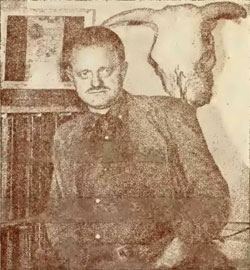 Missing program guides from the earliest years of KRAB make it difficult to state with certainty when some programs first started airing on KRAB. But we were able to locate a Seattle Times clipping that states "The second in a continuing series of book reviews by Kenneth Rexroth, controversial poet and critic, will be aired at 9:30 [Jun 10, 1963] on KRAB."
Missing program guides from the earliest years of KRAB make it difficult to state with certainty when some programs first started airing on KRAB. But we were able to locate a Seattle Times clipping that states "The second in a continuing series of book reviews by Kenneth Rexroth, controversial poet and critic, will be aired at 9:30 [Jun 10, 1963] on KRAB."
The KRAB program guide listing for Dec 12, 1965 says Kenneth Rexroth reviews that endless pile of books on the table, near the window, next to the noisy tape recorder. Rexroth generally recorded all these programs at home, sometimes on the road, sometimes in San Francisco, and other times in Europe. He frequently had technical issues with his equipment. KPFA made a point of disclaiming responsibility for the audio quality by stating the programs were recorded for them.
The first KPFA Folio mention of Kenneth Rexroth's autobiography is on the morning of Jun 7, 1959, when an episode of Books aired on Jun 4th was re-titled "The Autobiography of Kenneth Rexroth: another installment, read by the author. (June 4)." Speculating, it appears he had been sending (from Europe) autobiography tapes mixed in with his book reviews.
The Pacifica Radio Archives online database describes the autobiography as spanning 49 reels (1435 minutes) and first being broadcast on KPFA between 1962 and June 1963, but, as mentioned above, entries are found in the KPFA Folio for much earlier dates.
The KRAB guides in our collection have listings for 26 Autobiography episodes from Sep 29, 1967 to Nov 4, 1968. There are four outliers, two in 1971, one in 1976, and one in 1982, which all appear to be dubs or original tapes that were archived, but now lost.
The May 1958 KPFA folio (click here) has an article about Rexroth. There is also a lot of interesting material at the Kenneth Rexroth Archive.
Our tapes were saved from an Ebay auction. The one dated Jan 5, 1968, last in the list below, based on the "KRAB" notation in the upper right corner of the tape label appears to have been the copy made to send to KRAB.
The dates below reflect the first Pacifica/KPFA and WBAI rebroadcasts of the autobiography, which started Oct 26, 1961, and Apr 21, 1962 respectively.
|
|
|
|
|
|
|
|
Recording collection of C Reinsch, PRA BB1076a
Marshal McLuhan - From Gutenberg to Batman - KRAB Jul 10, 1968
A lecture given by Marshall McLuhan at Annenberg School of Communications, Philadelphia, in April of 1966. Symbol manipulation, the world of the happening, training of human perception and the potency of pop art. A tape that doesn't seem to have any beginning, middle or end.
 Opening remarks by Dr George Gerbner, Dean of the Annenberg School. Then, Professor of Communications Robert Lewis Shayon introduces the other participants:
Opening remarks by Dr George Gerbner, Dean of the Annenberg School. Then, Professor of Communications Robert Lewis Shayon introduces the other participants:
William Jovanovich, president of Harcourt, Brace, and World, Inc;
Dr Dell Hymes, anthropologist;
William Dozier, creator/producer of the TV series, "Batman";
Professor Marshall McLuhan, Director of the Centre for Culture and Technology at the University of Toronto
Starting at just over 13 minutes Marshall McLuhan speaks.
At about 46 minutes the other participants comment upon McLuhan's lecture and take questions from the audience.
![]() Listen now - Marshal McLuhan - From Gutenberg to Batman - KRAB Jul 10, 1968 (75:52)
Listen now - Marshal McLuhan - From Gutenberg to Batman - KRAB Jul 10, 1968 (75:52)
Collection c reinsch
Dave Harris at Reed - Recorded Jul 20, 1968 - KRAB Aug 2, 1968
Ex-Stanford student body president and draft refuser speaking at Reed College on the 20th of July, 1968. "Any revolution is a revolution for the police and National Guard as well, or it's no revolution at all. If it's a revolution for those people, then the first obligation you have is you don't kill them. This country will never be changed until there's a non-violent revolution. A violent revolution to my mind offers no change in American society." A KBOO tape from Portland.
Recorded by David Calhoun.
This recording was located in the archives of KDNA now held by the The State Historical Society of Missouri. KDNA was a member of the KRAB Nebula and the tape seems to have made it to them. Link for more about: KRAB Nebula.
Could not find anything online about the Reed College appearance, but Harris visited Seattle 2 weeks later and there was a short piece in the Seattle Times Aug 7.
![]() Listen now - Dave Harris at Reed - KRAB Aug 2, 1968 (59:25)
Listen now - Dave Harris at Reed - KRAB Aug 2, 1968 (59:25)
Recording courtesy of The State Historical Society of Missouri
The Outside with Steve Post - WBAI Nov 9, 1968; KRAB sometime later
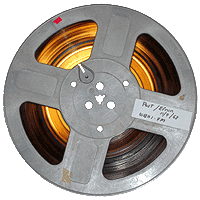 The Outside - Steve Post asks you to guess how many fingers he is holding up. [WBAI folio Nov 9, 1968, vol 9 no 11]
The Outside - Steve Post asks you to guess how many fingers he is holding up. [WBAI folio Nov 9, 1968, vol 9 no 11]
I remember this tape (or a dub of it) bouncing around the doughnut shop for several months. How it got to KRAB I do not know. KRAB had been broadcasting a one hour abridgement of Bob Fass's "Radio Unnameable", called Night Into Day, since May 1967. Perhaps Steve Post, host of "The Outside", on WBAI Saturday and Sunday nights, heard that Jean Shepherd and Bob Fass were getting airplay on the West coast and, wanting to get in on the action, sent this as an audition. Or, maybe he wanted to see if listeners in Seattle could tell the difference between Fass, Post and Josephson. It was pretty funny, and occasionally surreal, as he pushes the limits of audience gullibility.
The tape surfaced last year in an ebay auction. And eventually passed into my hands. It is in pretty sad condition. Like some of the reels at KRAB patched together with scraps from many, many, other reels, it is made up of many, many, short pieces of acetate and failing splices. Wound now tails out, but apparently stored heads out for years, as the beginning of the tape ("heads") had dried, curled and crumbled, as acetate is wont to do, and someone had patched the one inch (and smaller) crumbles together with great long pieces of splicing tape.
Even with the deterioration, it still sounds better than Graham Bell's "Watson, come here" or Edison's "Mary had a little lamb". So here's your chance to hear Steve Post, Marshall Efron, Spiro Agnew, the Talking Duck, a typical subscriber, an irate caller, and the "truth" about all those WBAI radio celebrities that New Yorkers thought they were listening to.
In 1974 Post included transcripts of the Spiro Agnew and Talking Duck interviews in his reminiscence "Playing in the FM Band - A Personal Account of Free Radio".
 Steve Post died Aug 3, 2014. Linked here is an obituary/remembrance written by Larry Josephson.
Steve Post died Aug 3, 2014. Linked here is an obituary/remembrance written by Larry Josephson.
![]() Listen now -The Outside with Steve Post - WBAI Nov 9, 1968; KRAB sometime later (59:08)
Listen now -The Outside with Steve Post - WBAI Nov 9, 1968; KRAB sometime later (59:08)
If you would like to hear more of Steve Post, this link will take you to a collection from his days at WNYC.
Recording courtesy C Reinsch, CR0082
The Study of Man - From the annual meeting of the American Anthropological Association - Rec Nov 21-24, 1968; KRAB Jan 5, 1969
(Originally scheduled for Dec 22, 1968) THE STUDY OF MAN a team of guerillas looks at the annual meeting of the American Anthropological Association held Nov 21-24 at the Olympic Hotel in Seattle. Tape recorded talks and interviews with music added by Jeff Dann, Charles Taylor and their assistants.
(Rescheduled Jan 5, 1969) THE STUDY OF MAN rescheduled after its cancellatlon in the last guide. A worm's eye view of a professional convention, in this case the meeting of the American Anthropological Association in Seattle, Nov 21-24, 1968. Hopefully, it will be a lesson in methods of field work; a forthright, biased account.
The Seattle Times covers the meeting (click here).
 Found on the last twenty minutes of JSF PA0703 (an interview of Andre Martin about the strike at SF State), and is an excerpt that begins and ends abruptly.
Found on the last twenty minutes of JSF PA0703 (an interview of Andre Martin about the strike at SF State), and is an excerpt that begins and ends abruptly.
Recording courtesy Jack Straw Foundation, PA0703
Marijuana Teach-in, University of Washington, Jan 22, 1969 - KRAB Feb 13, 1969
Found on the "flip side" of one of the "Magic Fingers" recordings. Described in the program guide as follows:
THE MARIJUANA TEACH-IN at the University of Washington January 22, 1969. (1) Introduction by Rick Hull ( 2) "Marijuana and the law" by Allen Evans of the U. W. Law Review (3) "The Police View" by Al Wilding, of Seattle Police Department (4) "The Pharmacology of Marijuana and summary of recent clinical studies" by Dr. Lawrence Halpern of the Department of Pharmacology (5) "The Constitutionality of Marijuana Prohibition" by Len Mandelbaum, Executive Director of the ACLU of Washington.
Unfortunately, all we have are a few, but choice, excerpts, each beginning and ending in mid-sentence.
Dr Lawrence Halpern, UW Department of Pharmacology speaking on "The Pharmacology of Marijuana and summary of recent clinical studies":
Len Mandelbaum, Executive Director of the ACLU of Washington speaking on "The Constitutionality of Marijuana Prohibition":
![]() Listen now - Marijuana teach-in Excerpts - KRAB Jan 22, 1969 (31:39)
Listen now - Marijuana teach-in Excerpts - KRAB Jan 22, 1969 (31:39)
Recording courtesy Cathy Palmer and Jeffrey R Thompson
Professor Andre Martin talks with Jon Gallant and Lorenzo Milam about the strike at SF State - Rec Feb 8, 1969; KRAB Feb 21, 1969
Prof Andre Martin, member of the AFT's strike committee at San Francisco State, is interviewed by Gallant and Milam and clarifies the situation of the faculty strikers.
The pamphlet that Lorenzo asks Prof Martin about can be seen at The Sayings of Chairman S I Hayakawa
 For more about the strike, see "STRIKE!... Concerning the 1968-69 Strike at San Francisco State College"
For more about the strike, see "STRIKE!... Concerning the 1968-69 Strike at San Francisco State College"
![]() Listen now - Prof Andre Martin talks with Jon Gallant and Lorenzo Milam about the strike at SF State - Rec Feb 8, 1969; KRAB Feb 21, 1969 (42:22)
Listen now - Prof Andre Martin talks with Jon Gallant and Lorenzo Milam about the strike at SF State - Rec Feb 8, 1969; KRAB Feb 21, 1969 (42:22)
Recording courtesy Jack Straw Foundation, PA0703
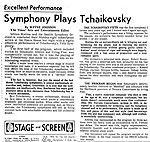 Symphony Review with Geoffrey Hewings - KRAB Mar 25, 1969
Symphony Review with Geoffrey Hewings - KRAB Mar 25, 1969
Geoff Hewings tells it like it was.
![]() Listen now - Symphony Review with Geoffrey Hewings - KRAB Mar 25, 1969 (11:27)
Listen now - Symphony Review with Geoffrey Hewings - KRAB Mar 25, 1969 (11:27)
Recording courtesy Geoffrey Hewings
Roachdale Election Returns, Seattle USA - KRAB Nov 4, 1969
ELECTION RETURNS - The Toachdale Radio Network sends its dedicated news staff to the task of covering Seattle's mayoral election returns. Could be interesting.
An agent of change vs business as usual. . . . .
Greg Palmer, Dulcet-toned David Rowland, Doug Hosner, and the rest of The Roachdale Radio Players cover the Wes Uhlman - R Mort Frayn race to the mayoral throne. Lyle Burt wrote in The Seattle Times (click here for next day results) "The Uhlman - Frayn contest was a classic in contrasts. Uhlman, 34, highly articulate champion of his cause, called for new approaches to the city's problems. Early in the campaign he portrayed himself as 'being willing to try the untried' and pounded at this slogan until the end."
 "Frayn, 63,emphasized his years of experience in politics and civic activities, contending these had given him the necessary contacts to attract the city's best minds to solving of its problems."
"Frayn, 63,emphasized his years of experience in politics and civic activities, contending these had given him the necessary contacts to attract the city's best minds to solving of its problems."
![]() Listen now - Roachdale Election Returns, Seattle USA - KRAB Nov 4, 1969 - KRAB Nov 4, 1969 (33:53)
Listen now - Roachdale Election Returns, Seattle USA - KRAB Nov 4, 1969 - KRAB Nov 4, 1969 (33:53)
Recording courtesy Cathy Palmer, CP0029
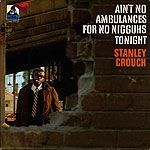 Ain't No Ambulances for no Nigguhs Tonight - KRAB Dec 21, 1969
Ain't No Ambulances for no Nigguhs Tonight - KRAB Dec 21, 1969
Stanley Crouch, drummer and poet, speaks at a Black Student Union Benefit Concert in Los Angeles. This was recorded last Spring and is a Flying Dutchman production.
The original tape label for this program was lost long ago, and at some point replaced with the notation "Lecture by Black male about Blacks in Arts World". A little research led us to Stanley Crouch. One clue was here (4'36") Harlem on My Mind, and another one, at about 23'20" when he introduces his poem Ain't No Ambulances for no Nigguhs Tonight.
![]() Listen now - Ain't No Ambulances for no Nigguhs Tonight - KRAB Dec 21, 1969 (46:21)
Listen now - Ain't No Ambulances for no Nigguhs Tonight - KRAB Dec 21, 1969 (46:21)
Recording courtesy Jack Straw Foundation, JSF PA1397
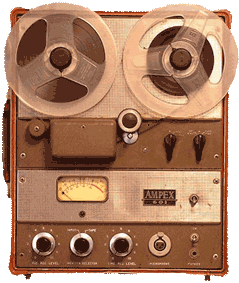
An Ampex 601 was used for remote recordings
We would drag around the tape deck, mic stand, and microphone, extension cords, and lots of 7-1/2" reels of tape in a leather satchel. I hauled the whole kit down to the Moore Theatre to record George Wallace who was running for President, only to be berated by protesters ("Whatcha' wanta tape him for?") and then interrogated and ejected by the Secret Service. On other occasions I did manage to record Allen Ginsberg at Reed College (on a pleasant Spring day in Mar or May 1967) and Ram Das at UW Hec Edmundson (Oct 12, 1975). It is very strange these two clips survived.
We also had a battery operated deck, a Tandberg, or Uher(?). It had a leather case.
Who else got sent out on these missions, and what did you record?
![]() Listen now - Allen Ginsberg at Reed - Mar 1967 (4:00)
Listen now - Allen Ginsberg at Reed - Mar 1967 (4:00)
![]() Listen now - Baba Ram Das - UW Hec Edmundson - Oct 12, 1975; KRAB Dec 25, 1975 (1:17)
Listen now - Baba Ram Das - UW Hec Edmundson - Oct 12, 1975; KRAB Dec 25, 1975 (1:17)
Recordings collection of C Reinsch
Go to spoken word programming of the | |||||
If you possess any souvenirs (program guides, tapes, or photos) or have a story about your experience with KRAB you are willing to share, please email archive@krabarchive.com


